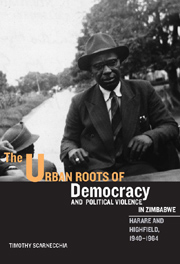Book contents
- Frontmatter
- Contents
- List of Illustrations
- Acknowledgments
- List of Abbreviations
- Notes to the Reader
- Introduction
- 1 Charles Mzingeli's Leadership and Imperial Working-Class Citizenship
- 2 Township Protest Politics
- 3 Resistance to the Urban Areas Act and Women's Political Influence
- 4 Changing Tactics: Youth League Politics and the End of Accommodation
- 5 The Early Sixties: Violent Protests and “Sellout” Politics
- 6 The “Imperialist Stooge” and New Levels of “Sellout” Political Violence
- 7 The ZAPU-ZANU Split and the Battlegrounds of Harare and Highfield
- Conclusion
- Notes
- Selected Bibliography
- Index
- Title in the series
1 - Charles Mzingeli's Leadership and Imperial Working-Class Citizenship
Published online by Cambridge University Press: 12 September 2012
- Frontmatter
- Contents
- List of Illustrations
- Acknowledgments
- List of Abbreviations
- Notes to the Reader
- Introduction
- 1 Charles Mzingeli's Leadership and Imperial Working-Class Citizenship
- 2 Township Protest Politics
- 3 Resistance to the Urban Areas Act and Women's Political Influence
- 4 Changing Tactics: Youth League Politics and the End of Accommodation
- 5 The Early Sixties: Violent Protests and “Sellout” Politics
- 6 The “Imperialist Stooge” and New Levels of “Sellout” Political Violence
- 7 The ZAPU-ZANU Split and the Battlegrounds of Harare and Highfield
- Conclusion
- Notes
- Selected Bibliography
- Index
- Title in the series
Summary
Charles Mzingeli's historical legacy is complex, but one aspect of it is in serious need of revision. The notion that he was a “sellout” needs to be put in the context of what came before the 1960s, and of how he felt a betrayal by the younger leaders, particularly after the original decision to boycott the African seats in the Federation Parliament was ignored in 1952. A more realistic view of Mzingeli might be that he consistently did his best to counter any attempts by European authorities to deny African politicians a space to govern themselves. His strategy was to look for opportunities to take over “rubber-stamp” organizations such as the township advisory board and the African Welfare Society, making sure that he and members of his organization, the Reformed Industrial and Commercial Workers Union (RICU), dominated these groups until the late 1950s. Mzingeli's notion of imperial citizenship was therefore significantly different than that of the mission-educated elite—the groups of men who lived outside of the township and saw themselves as the most qualified to represent African interests. Mzingeli sought to provide protection for a wider range of individuals living in the township through his rhetoric around the dignity of labor. For him, formal education was not the only thing that gave a person value, and his distrust of the more educated elite was shared in the township.
- Type
- Chapter
- Information
- The Urban Roots of Democracy and Political Violence in ZimbabweHarare and Highfield, 1940–1964, pp. 12 - 28Publisher: Boydell & BrewerPrint publication year: 2008



